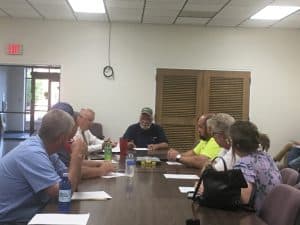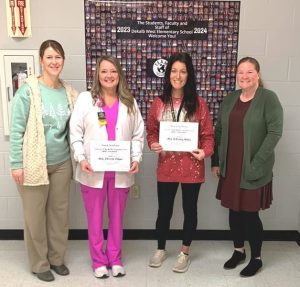News
Planning Commission to Undertake Study of Possible County-Wide Zoning Outside Municipalities
December 11, 2024
By: Dwayne Page
The DeKalb County Regional Planning Commission Monday night voted in favor of pursuing a study on a plan for county wide zoning outside the city limits of the four municipalities as requested by the full county commission in September although two planning commission members were opposed.
During the regular monthly meeting, Planning Commission member Greg Matthews, who is also a county commissioner, said he is opposed to zoning fearing it would restrict property owners’ rights. Matthews also objected to the October passage by the county commission of the county powers act for the same reasons.
“The county powers act has already been passed, and this other thing (regulations) have also passed to stop all the stuff that nobody wants,” said Matthews. “ I say we squash this and be done with it. Is it not every committee’s job to say yes or no. I’m not for this and I never was for it. We have already taken some people’s rights and we are now looking to take more (rights),” asked Matthews.
Matthews made a motion to not pursue the county commission’s request for a zoning study. Planning Commission member Alan Webb offered a second to the motion, but the motion failed 7-2. Chairman Rick Cantrell and planning commission members Jack Barton, Harold Bain, Beth Pafford, Andy Pack, Jeff Barnes, and Danny Pirtle voted against the motion and to begin the study with the aim of eventually making a recommendation on a zoning resolution to the full county commission which has the final say on the issue following a public hearing. Tommy Lee, Director of the Upper Cumberland Development District, who serves as UCDD staff planner and advisor to DeKalb County, said it may take up to 18 months for the planning commission to come up with a recommendation.
“The county commission requested that we study or pursue a zoning resolution to hand to the county commission for their review. I told the county mayor that tonight we would take a big picture look at zoning and go over again what it does and what it doesn’t do and what specific districts would look like, jurisdiction, costs to the county, and things of that nature and in the months to follow we will look at the specific sections of that ordinance. Hopefully we will then come up with something we can recommend to the county commission or at least hand it to them,” said Lee.
Lee went on to explain the pros of zoning.
“The pros are to protect and enhance property values by not allowing incompatible uses to be located next to each other. We are promoting compatible uses in a zoning ordinance. Preserve neighborhoods. Preserve existing structures, Prevent the mixing of incompatible land uses. An example is an erotic dance club near a school. Technically right now they could go next to each other. Zoning allows potential nuisances to be located away from residential neighborhoods and other sensitive areas. Zoning can provide for better lot arrangement. It can protect recreational areas and open space and conserve environmentally sensitive areas. Zoning can ensure the availability of an adequate number of parking spaces for commercial, industrial, and multi-family residential uses. It can guarantee adequate light, air, and privacy to homes. More importantly, zoning gives the community some control over its land uses, appearance, and quality of life for the future”.
Lee then discussed the cons of zoning.
“Zoning requires that all involved property owners relinquish some of their individual property freedoms for the common good. Zoning can discourage some development in some locations. Zoning can increase the cost of building new structures. Zoning can work against historic mixed use neighborhoods in older communities. To a certain extent, zoning limits the development potential of previously existing land uses and structures that do not conform with zoning standards. Another con is the cost to the community which comes in the form of a code’s enforcement officer. This is mandatory if you have a zoning ordinance. Its not a state law or county law but why would you have a zoning ordinance if you didn’t have a mechanism to enforce it. A codes enforcement officer provides that. Zoning does regulate land use. It tells you what you can and can’t do on your property. Zoning does not regulate the appearance of a structure or a lot. Zoning does not tell you how high your grass has to be. It does not tell you that the shutters on your house have to be a certain color. It also does not regulate construction. That’s what building codes do. Zoning codes are the regulation of land uses. Every parcel in unincorporated DeKalb County, if this passes, would be subject to the zoning ordinance. Parcels that would be exempt from this are those located in the corporate limits of the cities of Smithville, Liberty, Dowelltown, and Alexandria. If you are located inside the municipalities, you are not subject to the county zoning ordinance,” Lee explained.
Using neighboring Cannon County’s zoning ordinance as a model, Lee explained that DeKalb County could have basically four zoning districts: residential, commercial, industrial, and agriculture.
“Districts are land uses that are compatible and you establish criteria for these districts. In neighboring Cannon County there are four districts: residential, commercial, industrial, and agricultural. Residential districts are essentially large or high concentrations of single-family residential homes. For example, Coconut Ridge would be considered an R-1 or residential district. What is typically allowed in a residential district are single family homes, customary home occupations which are uses or businesses that are located in somebody’s house. For example, if you own a beauty shop and run it out of your house or garage. That is considered a customary home occupation. Accessory structures are permitted that are incidental to the primary uses such as single-family residential structures. Examples are pole barns, garages, she sheds, etc. You can allow for more things but if you are talking about a typical R-1 residential district you are talking about single family homes, customary home occupations, and accessory structures. What is not permitted there are duplexes, mobile homes, apartment buildings, businesses, and industries typically but counties can adjust as they see fit,” Lee said.
“The next district is a commercial district. Think where you buy stuff and sell stuff. The traditional big picture of commercial is buying and selling. What would be typically permitted in a commercial district? Businesses, professional services. You can allow apartment complexes in there. Typically, what Cannon County did was allow all commercial businesses except for adult oriented uses. What you must understand also is that if a business is legally allowed by the state of Tennessee you have to allow it to go somewhere in your county which means you can’t zone out a business if the state of Tennessee allows it. Adult oriented businesses, landfills, asphalt plants and things like that must be allowed in the county somewhere but what most communities do with undesirable uses is they put them as a special exception in an industrial zone. Its up to the county to determine what is an undesirable use. If we adopt this zoning ordinance anything that is legal and lawfully existing at the time that you adopt the ordinance is for lack of a better term grandfathered in. Most commercial uses, professional services, churches, semi-public uses are all allowed in a commercial use zone”,” Lee continued.
“The industrial zone is where you manufacture stuff as a permitted use. That is your Tenneco’s, federal moguls, sawmills, etc. Basically, if you are creating or making something that is considered an industrial use. That is the industrial district”.
“Finally, and what we did in Cannon County is make about 95% of the county an agriculture zone. What do we allow in an agriculture zone? Two uses, single family homes and agriculture. We have a caveat in the A-1 district that all other uses not specifically permitted can be brought to the board of zoning appeals and be considered on appeal. If you have a zoning ordinance you must have an appellate process in which a citizen may go and appeal what is laid out in the zoning ordinance and that is called the Board of Zoning Appeals which is typically separate from this board,” said Lee.
At the next meeting, Lee plans to share with the planning commission Cannon County’s zoning ordinance as a possible guide.
DWS November Students, Teacher and Employee
December 10, 2024
By: Bill Conger
DeKalb West School has announced the Students of the Month for November. Students are recognized for academics, character, and other traits that make them an excellent student. Congratulations goes to Dakota Anderson, PreK; Kaizlee Sparks, Kindergarten; Leo Vogeler, 1st, Aiden Checchi, 2nd, Tillie Stanley, 3rd, Joey Stoner, 4th, Maddison Baratta, 5th, Sylar Hickman, 6th, Preston Williams, 7th, and Malachi Gaither, 8th.
Kindergarten teacher Whitney Brelje was chosen as Teacher of the Month while the Employee of the Month was awarded to nurse Christie Driver.
Local Investigation Leads to Arrest of California Man in Child Sex Crime
December 10, 2024
By: Dwayne Page
A local investigation has led to the arrest of a California man accused of soliciting nude photos from a seven-year-old girl.
18-year-old Nathan Corona of Moreno Valley, California is charged in a grand jury sealed indictment with exploitation of a minor under age 13 and soliciting sexual exploitation of a minor. Corona was extradited from California and was to make his first court appearance for arraignment in DeKalb County Monday, December 9. He is under a $200,000 bond.
According to Sheriff Patrick Ray, the investigation of Corona began in June after local law enforcement officers learned in May that Corona, by way of social media and cell phone communication, had been in contact with the child and that he had her send him nude pictures of herself.
“It was first reported to the Smithville Police Department, and they seized the victim’s cell phone. After discovering that the victim’s home was outside the city in DeKalb County, the sheriff’s department took custody of the phone and a detective was assigned the case,” he said.
Sheriff Ray said Corona, who called himself Nate, began his communication with the child through pop up chats in an internet game app which progressed to other social media apps used for minor sexual exploitation. According to Sheriff Ray, Corona had the child send him nude pictures of herself and he in turn sent photos of his exposed private parts to her.
The victim’s phone had no cell plan. She was using it through wi-fi only.
During the investigation, which was conducted jointly by sheriff’s department detectives, the TBI Criminal Division and Internet Crimes Against Children Division, and District Attorney General’s Office, the Department of Children Services was notified, and the victim was taken to the Upper Cumberland Children’s Advocacy Center in Cookeville to be interviewed.
After Corona was identified as a suspect and that he lived in California, the Riverside County Sheriff’s Department in California was contacted and through their task force on internet crimes against children they obtained a search warrant of Corona’s home and found digital evidence linking him to the crime. Sheriff Ray said Corona also gave a confession.
Sheriff Ray is appealing to parents to keep a close watch on what your children are doing on their phone or through social media.
“It is very important that parents know what their children are viewing online. Even though they may not have a personal or laptop computer, most any cell phone now has the capability of Wi-Fi so anyone can access WI-FI from a phone and search for anything they desire. We ask everybody who has children or grandchildren to be cautious to make sure they are viewing age-appropriate things on the internet because children are very vulnerable. If you have any questions or need to report suspicious website activity, call the sheriff’s department and we will have the detectives look into it,” said Sheriff Ray.
« First ‹ Previous 1 2 10 11 1213 14 22 112 2492 Next › Last »












